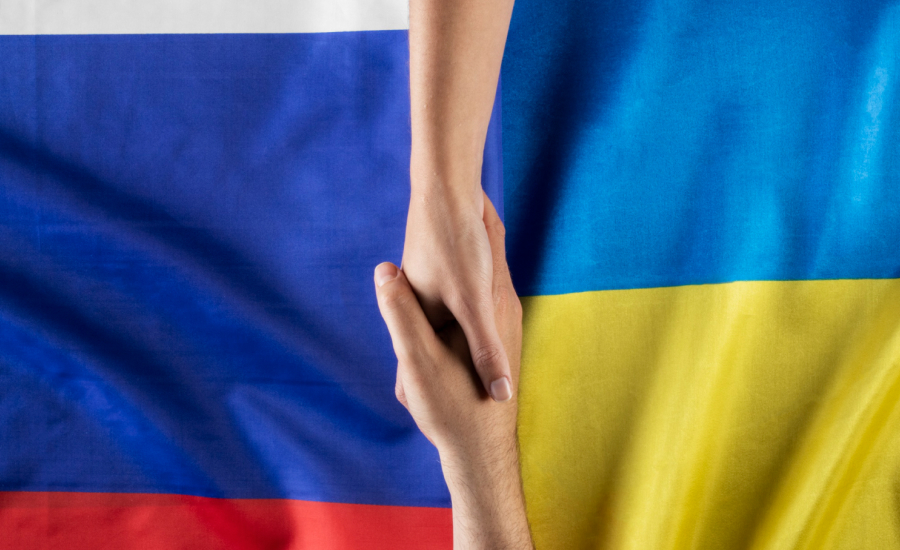Introduction
The ongoing conflict between Ukraine and Russia has caused immeasurable suffering, necessitating urgent action to alleviate the plight of the affected populations.
As a senior humanitarian in a leadership position, confronted with the overwhelming suffering of the population and the tragic loss of both men and women on both sides of the conflict, I recognize the urgency to speak out, even while being aware of the potential impact my words may have. Humanitarian crises touch the core of our shared humanity, compelling us to advocate for peace and justice. The prolonged conflict between Ukraine and Russia has resulted in immeasurable pain and devastation, and as a concerned observer, it becomes increasingly difficult to remain silent. The toll on innocent civilians, the displacement of families, and the countless lives lost demand our attention and action. As a senior humanitarian leader, I can no longer remain silent in the face of such overwhelming devastation.
It is also imperative to emphasize the moral imperative of respecting both presidents, upholding the dignity of the people, and advocating for a peaceful resolution. Drawing inspiration from the peacemaking legacy of Jimmy Carter, this article explores the need for personal diplomacy, an abandonment of charges, and the crucial role of a senior European or global leader to mediate negotiations in a safe environment, mirroring the success of Camp David.
The Call for Personal Diplomacy
The complexity of the Ukraine-Russia conflict demands a personal diplomacy approach, where leaders engage directly in negotiations, setting aside political rhetoric and focusing on mutual understanding. This approach, as described by George W. Bush, emphasizes the need for leaders to look into each other’s eyes, fostering trust, empathy, and a shared commitment to peace. By prioritizing personal diplomacy, both sides can bridge divides and find common ground to end the conflict.
Personal diplomacy encourages leaders to step out of their comfort zones and actively listen to opposing viewpoints. It requires a willingness to challenge preconceptions and search for common ground. Through this process, leaders can build trust and create a foundation of understanding upon which productive negotiations can take place.
The call for personal diplomacy acknowledges that conflicts are not solely about policies and interests but are fundamentally rooted in the experiences and aspirations of individuals and communities. By engaging in direct dialogue, leaders can address these underlying emotions and motivations, ultimately paving the way for a more meaningful and sustainable resolution.
Personal diplomacy is not without its challenges. It requires courage, patience, and a genuine commitment to peace. However, the potential rewards are significant. By fostering a spirit of openness and understanding, personal diplomacy can break down barriers, build bridges, and lead to the development of creative and mutually beneficial solutions.
In a world that often seems driven by division and conflict, the call for personal diplomacy offers a glimmer of hope. It reminds us that at the heart of every conflict are people with desires, fears, and aspirations. By embracing personal diplomacy, leaders have the opportunity to transcend political posturing and work towards a future where understanding, cooperation, and lasting peace prevail.

Respecting Presidents Vladimir Putin and Volodymyr Zelensky and Upholding Dignity of their people
Resolving the Ukraine-Russia conflict requires a foundation of respect for the leaders of both nations. Acknowledging their respective positions and the dignity of their people is essential for fostering an environment conducive to constructive dialogue. By recognizing the legitimacy of each leader’s concerns and grievances, it becomes possible to create a space where honest discussions can take place, leading to a sustainable peace agreement.
A Safe Environment for Negotiations: Emulating Camp David
To ensure productive negotiations, it is essential to establish a safe and neutral environment, akin to the success achieved at Camp David. This venue would provide the necessary privacy and security for leaders to engage in candid discussions, away from the pressures of public scrutiny. By emulating the Camp David model, Ukraine and Russia can focus on finding common ground, developing innovative solutions, and forging a path towards lasting peace.
International Support and Mediation
Just as the Camp David Accords received international support, any peace process for Ukraine and Russia would require the backing of the international community. International organizations, such as the United Nations and the European Union, could play a vital role in providing mediation, facilitating negotiations, and supporting the implementation of peace agreements. Regional powers and influential nations should contribute their expertise and resources to help build a sustainable peace framework.
The Role of Former President Jimmy Carter
Former President Jimmy Carter’s remarkable peacemaking efforts at Camp David serve as an inspiration and remind us of the transformative power of dialogue and negotiation. President Carter’s diplomatic skills, commitment to human rights, and unwavering dedication to peace make him a guiding light for resolving conflicts through peaceful means. His legacy should inspire current leaders and mediators involved in Ukraine and Russia’s peace process.
The Role of a Senior European or Global Leader
In the pursuit of peace, the involvement of a senior European, BRICS, or global leader with the stature and gravitas of Jimmy Carter is paramount. This individual would serve as a mediator, providing impartiality and expertise to enable negotiations between Ukraine and Russia. Such leadership, whether from the United States President, a senior EU leader such as Mark Rutte, the UN Secretary-General, or another respected figure, can help bridge the gaps, build trust, and guide the parties towards a mutually acceptable agreement.
Abandoning Charges and Ensuring Accountability
To pave the way for meaningful negotiations, it is imperative to consider the abandonment of charges and legal proceedings against key individuals involved in the conflict. However, it is crucial to strike a balance between offering immunity to facilitate dialogue and ensuring accountability for past actions. Any peace agreement should include mechanisms to address grievances, establish truth and reconciliation processes, as in South Africa after apartheid, and ensure that those responsible for grave violations of human rights are held accountable, either through domestic or international legal frameworks. Combining the need for immunity with the pursuit of justice can create a path towards lasting peace that upholds the principles of justice and human rights.

The Importance of Reconciliation
Addressing grievances and establishing truth and reconciliation processes are integral to sustainable peace. Inspired by models such as South Africa’s post-apartheid experience, Ukraine and Russia should incorporate mechanisms to promote healing, bridge divides, and foster understanding. These processes allow for the acknowledgment of past atrocities, truth-telling, reparations, and initiatives that promote empathy and dialogue. By actively engaging in reconciliation efforts tailored to the context, both nations can lay the groundwork for a harmonious and inclusive future.
Conclusion
The time has come for personal diplomacy, rooted in respect, dignity, and a commitment to peace, to guide negotiations between Ukraine and Russia. Leaders must set aside political posturing and prioritize dialogue to resolve the conflict. By considering the abandonment of charges, offering a balanced approach to immunity, and establishing mechanisms for truth and reconciliation, we can create a safe environment conducive to meaningful negotiations. In pursuing a comprehensive peace agreement, it is vital to ensure that accountability for past actions is not compromised. Let us draw inspiration from the success of Camp David, where leaders looked into each other’s eyes and made history. Now is the moment for leaders to rise above political differences and work towards a comprehensive peace agreement that brings stability, reconciliation, and hope for the people of Ukraine and Russia. This is a call for Peace.
